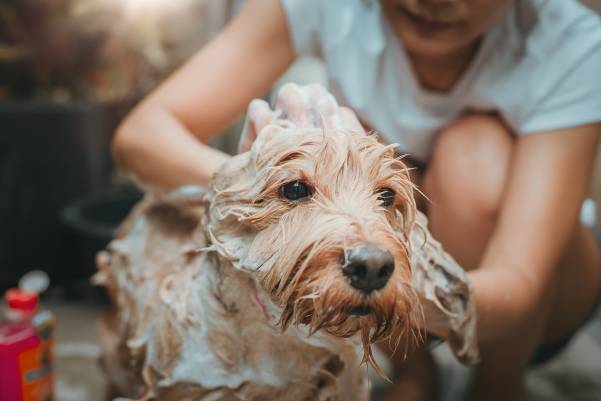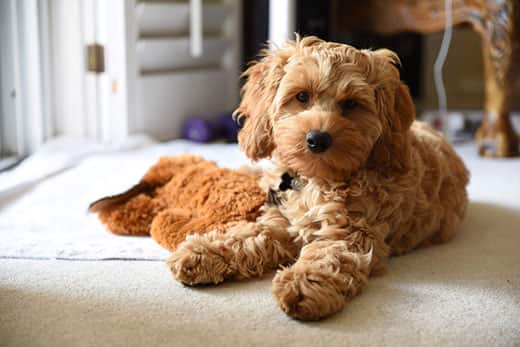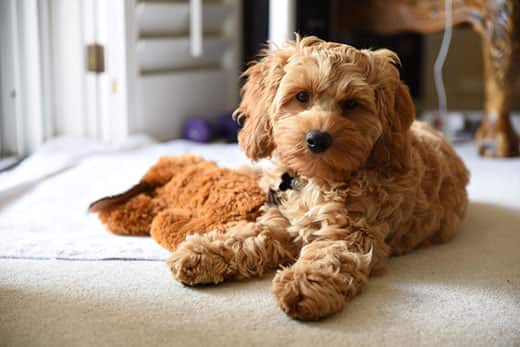Are you interested in adopting a Cockapoo? Are you the new pet parent of a cockapoo? Then you’ve come to the right place!
Connect with a verified veterinarian in minutes. Licensed vets are available 24/7 to answer your questions. No need to worry about your furry family member.
In this article, we’re going to take a look at the Cockapoo breed, characteristics and more. We’ll also review the pros and cons of becoming the pet parent to one of these adorable dogs!
What is a Cockapoo?
Cockapoos are a lovely crossbreed dog, which is a cross between a purebred Poodle and a purebred Cocker Spaniel. In this type of dog, it doesn’t matter which parent belongs to which breed; however, both parents should be purebreds.
The Cockapoo first became popular in the U.S. back in the 1950s, making them one of the oldest crossed dog breeds. It’s not clear if the breeding of a purebred Poodle and Cocker Spaniel was intentional or not; however, this dog has remained popular over the years. These precious pups are not a breed that’s recognized by any kennel association, but they are an adorable crossbred dog.
You may sometimes hear Cockapoos referred to by other names including:
- Cocker Spaniel Poodle
- Cocker Poodle
- Cock-a-poo
- Cockapoodle
- Cockerpoo
- Cock-a-doodle
- Cocker Spaniel Poodle Mix
This can be confusing, but all of these names are sometimes applied to Cockerpoos! No matter what you call them, these fur babies are adorable!
Cockerpoo Characteristics
One thing to know and understand about Cockerpoos is that there are wide variations when it comes to dog sizes, characteristics (such as fur type and color) and more. Some dogs will look more like Poodles, or more like their Cocker Spaniel forebears, and a good mix of both.
Even puppies from the same litter can vary greatly. For example, some dogs’ temperaments will be more like a Poodle, while others strongly resemble the Cocker Spaniel side. It’s important to understand that puppies from the same litter can even have different personalities and temperaments. Each dog is a unique, loving being. Your fur baby will need to be loved and accepted for who he is.
When it comes to their fur, some Cockapoos will have a scruffier appearance, while others may have longer fur with tighter curls. And they come in a wide variety of colors. They generally come in four different sizes. Cockapoo size on average:
- Teacup: an adult dog will weigh less than 6 lbs and stand just under 10 inches tall
- Toy: the adult dog will weigh less than 12 lbs
- Miniature: the adult dog will weight up to 18 lbs and stand about 14 inches tall
- Maxi (or Standard): weighs over 19 lbs (can go up to 30 lbs) and stand at least 15 inches tall

Review symptoms, medications & behavior to keep your pets healthy with a Vet Online in just minutes.
Ask a Vet Live NowCockapoo Health
There are some things to consider before you adopt a Cockapoo. These pretty dogs generally have a life span of 13-15 years; some have even been known to live for 20 years. As a hybrid dog, Cockapoos do sometimes inherit health issues from both the Poodle and the Cocker Spaniel. These can include:
- Progressive retinal atrophy (PRA)
- Ear troubles
- Hip dysplasia
- Luxating patella
- Primary glaucoma
- Retinal dysplasia
- Familial Nephropathy (FN) (recessive kidney disease)
- Phosphofructokinase (PFK) (lack of this enzyme causes weakness, muscle cramps, and more)
Cockapoo Temperament
When it comes to temperament, Cockapoos are known for being loyal, loving and extremely affectionate with their families. If you enjoy a lap dog, then the Cockapoo may be the dog for you! In addition, these dogs are also accepting of everyone—from kids to seniors and even other pets. Their happy-go-lucky, sunny dispositions bring happiness wherever they go.
Not only are they loving and loyal, these beautiful dogs are also known for being extremely intelligent. And some people say their Cockapoos are a little too smart! Cockapoos are also quite trainable, as long as they have a close bond with their pet parents. Pet parents will need to use positive reinforcement methods in order to successfully train these pups. Cockapoos can be quite sensitive when it comes to being punished. Along with training, these dogs will need proper socialization from an early age.
Guide to Owning a Cockapoo: the Pros and Cons
As with any dog breed, there are pros and cons that go along with Cockapoos. Let’s take a look.
Pros
1). Cockapoos seem to love and accept everyone: if you have young kids or seniors living with you, then this is a great dog for your family. And if you have other pets, Cockapoos will also accept them into the pack. Your kids can have fun playing (supervised, of course) with their new friend, while seniors may enjoy the quiet snuggles of a Cockapoo in their laps. Expect a Cockapoo to bring a lot of energy, love, and happiness to your home. One note—because they accept everyone, Cockapoos are not good guard dogs.
2). Cockapoos don’t shed much: these dogs don’t shed very much, which is great news! While they are thought to be hypoallergenic, Cockapoos have dander just like other dogs. In fact, it’s not actually the dander that causes the allergies. Allergies are caused by a protein produced by the dog. The protein can also be found in a dog’s dander, saliva, urine, etc. So, while these dogs may be a good choice for some people with allergies, they may not be good for others. It just depends on the specific protein that sets off the person’s allergies.
3). Cockapoos come in various sizes: as noted earlier, these cute pups come in a variety of sizes, one that’s sure to be a good fit for you and your family. Teacup and toy dogs may not be the best choice if you have toddlers and young children. Instead, you may opt for a miniature Cockapoo that is sturdier. Whatever your family needs, you’ll find just the right size Cockapoo to bring home!
4). Cockapoos enjoy having fun: if you need a little more sunshine and joy in your life, then a Cockapoo may be the right dog for you! These loving dogs are well known for their playfulness and for being fun.
5). Cockapoos are adaptable: they can live in an apartment just as well as in a home in the burbs with a large fenced yard. However, if you live in an apartment, then you’ll definitely need to make sure your lively little friend gets plenty of exercise and mental stimulation.
Cons
1). Can be noisy: some Cockapoos, like their Poodle parents, tend to be on the yappy side. In fact, some of these dogs can be quite vocal. They are known for barking and even “talking” to their pet parents. By this, we mean that Cockapoos will use vocalizations to get their way. They learn how to “ask” or “demand” a snack, attention, etc. So, don’t be surprised if your fur baby begins to “talk.” Don’t say we didn’t warn you!
2). Cockapoos need proper socialization: while these dogs are highly intelligent and adaptable, you’ll still need to make sure to properly socialize your fur baby to new people, sights, sounds and experiences. This is especially true with puppies. Otherwise, there’s a high risk the dogs could develop separation anxiety or other unwanted behaviors.
3). Cockapoos can develop separation anxiety: because they’re so people-oriented, Cockapoos don’t like being left alone for hours on end. They can develop separation anxiety when left alone too much. These fur babies need to be around their family. If left alone too much or for too long, they can also become very vocal, or develop an excessive barking habit. Cockapoos may also become destructive, such as tearing up furniture or other items.
4). Caring for a Cockapoo: while Cockapoos don’t shed very much, they do need regular brushing and grooming. When they do shed, the fur tends to stay caught up in their coat, which make Cockapoos more susceptible to matts and tangles. This means that you’ll need to brush your canine companion at least once a day to avoid this problem. In addition, your pup will need to have his hair cut at the groomer about every 2-3 months. This helps to keep their hair free of tangles and matts and makes it easier to bathe them.
5). Cockapoos can be high energy: some Cockapoos are extremely energetic. These dogs will need to have more exercise and mental stimulation to keep them active and happy. Your Cockapoo may require more than one walk a day, along with a lot of playtime.
Cockapoo Price
Next, you’ll to consider where to adopt your Cockapoo. You can definitely find these amazing dogs with a reputable breeder, or you may be able to find one in an animal rescue facility. If you choose to find a breeder, then it’s best to find one that’s reputable. Using only a reputable breeder is best because you have a higher chance of adopting a healthier dog, and you’ll get to meet your new fur baby’s parents, too.
One of the best ways to find a good breeder is to ask your vet. They may be able to steer you in the right direction when it comes to a reputable Cockapoo breeder. You can also find Cockapoo kennel clubs that list reputable breeders. You can also check with family, friends and colleagues to see if they know of a good breeder. Whatever you do, avoid buying your new canine companion online. The ads are usually placed by puppy mill or backyard breeders. Cockapoo puppies typically cost anywhere from $900 to $2,500, while the price of an adult dog will vary. If you’re looking to adopt a Cockapoo from a rescue the adoption fee will vary.
When it comes to buying or adopting a Cockapoo, make sure the dog has all of the required shots including:
- Rabies
- Canine distemper
- Measles
- Bordetella
- Parvovirus
- Parainfluenza
- And more (depending on where you live)
Cockapoos can make a lovely addition to your family. Before adopting one of these beautiful, intelligent dogs, be sure that you’ll be able to spend a lot of time with your new fur baby. And always train them with love and positive reinforcement—you’ll have a loving, loyal companion for years to come!
Connect with a verified veterinarian in minutes. Licensed vets are available 24/7 to answer your questions. No need to worry about your furry family member.

Tom
Tom has always loved to write since he was little - he wanted to be either a writer or a veterinary doctor, but he ended up being a professional writer while most of his works are based on animals. He was born in San Francisco but later moved to Texas to continue his job as a writer. He graduated from the University of San Francisco where he studied biotechnology. He is happily married and a soon to be father!
Review symptoms, medications & behavior to keep your pets healthy with a Vet Online in just minutes.
Ask a Vet Live Now



